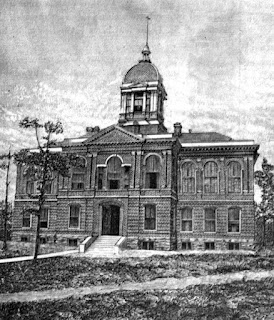 Mainline Florida: Link to Mainline Florida.
Mainline Florida: Link to Mainline Florida.
NOT Florida, however…
 |
| From WSJ |
BY TIM O'NEIL ST. LOUIS • On Aug. 22, 1876, voters in St. Louis and St. Louis County went to the polls to decide the region's most fateful ballot question - the "Great Divorce," or whether to split the city away from the county.
The idea narrowly carried the city but lost badly in the county. That should have been the end of it. But the tale is a complicated affair, as it has been ever since with any serious public issue straddling the city-county line.
In the years after the Civil War, business leaders of the fast-growing city became aggravated by what they considered meddling by the Missouri Legislature, made possible largely through statutes empowering St. Louis County government. As always, a big issue was taxation. Pro-separation leaders considered county government redundant and burdensome.
In 1875, the city was St. Louis County's largest municipality, and its boundary reached just past Grand Boulevard. But the 1870 population of 310,864 represented a 30 percent increase in the five years since war's end. The unincorporated county, meanwhile, was home to barely 31,000 souls. Kirkwood was a whistle-stop 12 blocks square, Ferguson a lonely station platform, Creve Coeur a post office. The future site of the courthouse in the future Clayton was a farm.
A special Board of Freeholders proposed to expand the city limit, separate it entirely from the county and create a city home-rule charter. The new boundary would more than triple the city's area, to 61.37 square miles, and take in Forest, Carondelet and O'Fallon parks. With so much land west of Grand undeveloped, boosters thought there was plenty of room.
Opposition came from rural interests and ward politicians such as Edward Butler, the city's closest example of a Tammany-style boss. When the votes were counted, city residents approved the split 11,878 to 11,525, but countians trounced it 2,617 to 848, for an overall "no" margin of 1,416 votes.
Prominent promoters cried foul and rushed to court. Hearings found such likely fraud as a rural precinct that recorded 132 votes against and two in favor, with 128 ballots showing eraser marks. A Butler minion, pressed in court about irregularities, blurted: "I deny the facts."
The Missouri Court of Appeals, including the vigorously pro-city Judge Thomas Gantt, eventually affirmed the tossing of 5,068 ballots, most of them "no" votes, for an overall victory margin of 1,253. The city declared itself independent in March 1877, and the courthouse crowd conceded.
Ever since, efforts to repair the divorce have taken upon a Humpty Dumpty difficulty. In 1926, a reconciliation carried in the city and failed in the county. In 1962, both sides of Skinker Boulevard rejected a New York-style borough plan. Pro-merger forces have had to content themselves with such steps as the Metropolitan St. Louis Sewer District, the Zoo-Museum District and the regional sales tax for trails.
And finally, in May of 2019, after months of widespread and unflagging criticism, organizers of the city-county merger initiative called Better Together, pulled their beleaguered consolidation proposal from ballot consideration.
*********
AntiphonGreek, anti- "opposite" + phonē "voice." A short text, typically from Scripture and often used as a refrain said by the congregation (e.g., during the Responsorial Psalm), though it has other uses in the liturgy. | |
CollectOne of the Introductory Rites. It is a prayer that varies depending on the liturgical day. It follows the Gloria and concludes the Introductory Rites. The former translation of Mass referred to it as the "opening prayer," but its historical name is restored in the new translation. | |
EpiclesisThe third part of the Eucharistic Prayer. In it, by means of particular invocations, the Church implores the power of the Holy Spirit that the gifts offered by human hands be consecrated. It follows the Acclamation (Sanctus) and precedes the Institution Narrative and Consecration. | |
Extraordinary Minister of Holy CommunionA person authorized to distribute Holy Communion, either for a particular occasion or in a more stable fashion, due to extraordinary circumstances such as lack of ordinary ministers of Holy Communion. The ordinary ministers of Holy Communion are bishops, priests, and deacons. All others are extraordinary. Note that the term "extraordinary minister of Holy Communion" is the correct term. Terms such as "extraordinary minister of the Eucharist," "eucharistic minister," and "special minister" are all incorrect. | |
Ordinary of the MassThose parts of the Mass that do not change based on the liturgical day. Also called the ordinary. Compare with Proper of the Mass. | |
Proper of the MassThose parts of the Mass that change based on the liturgical day. Also called the proper or the proper of the day. Compare with Ordinary of the Mass. | |
RubricsInstructions printed in red in a liturgical book (e.g., the Roman Missal) that direct the actions of those participating in a liturgical celebration. Rubrics are typically scattered among the text of the prayers (which are printed in black). Didn't see your favorite liturgical term on the list? There are many more important ones! My book Mass Revision: How the Liturgy Is Changing and What It Means for Youhas a guide to more than 200 liturgical terms! If you haven't already, I hope you'll pick up a copy. | |
Previous "studies" found that vaccinated carried less virus in the nose, now the opposite is being reported. Mixed messaging is defeating the vaccination drive. Most people will not understand the limitations of this type of data.
UPDATED 2:01 PM PT – Sunday, August 22, 2021
A 2010 letter written by Osama bin Laden commanded al Qaeda to specifically not target Joe Biden because his presidency would be a disaster for America. The letter was discovered at Bin Laden’s hideout in Pakistan after he was killed by U.S. forces in a 2011 raid.
The letter has been available to the public through the Combating Terrorism Center at West Point. The contents revealed Bin Laden commanding his followers to spare the life of then U.S. Vice President Biden and instead concentrate on taking out Obama as it would lead to a Biden presidency.
The other target was former CIA director David Petraeus. Bin Laden referred to Petraeus as “the man of the house” throughout the war and said his assassination would impact the U.S. war mission in favor of al Qaeda.
The 9/11 mastermind added no assassination attempt would be made on Biden because he was “totally unprepared” to take the post of presidency, which would “lead the U.S. into a crisis.”
| ||
|
Many of Jesus’ disciples who were listening said, “This saying is hard; who can accept it?”
What does it mean that our Lord’s saying is “hard”? Now, it could mean that it’s difficult to understand. And since our Lord was speaking about the Eucharist – the mystery of faith – that would be a fair reaction. It’s just too hard to grasp.
But that’s not what it means. The word “hard” here indicates something offensive or intolerable. That is why our Lord asks, “Does this shock [literally, scandalize] you?” In other words, “Do you find it offensive and intolerable?” He doesn’t ask if it confuses them, because by this point in the Bread of Life discourse, He has already clarified His teaching several times. They understand Him clearly enough; they are simply unwilling to accept what He taught. The problem here is not in the intellect, but the will.
More to the point, they were unwilling to accept what He taught because then they would have to change their lives. He was inviting them to yield their earth-bound view to His supernatural truths: “It is the spirit that gives life, while the flesh is of no avail.” (Jn 6:63) They intuited what His words meant: If this teaching was true, they would have to change their lives accordingly. So, they balked. Even after witnessing His miracles and signs, they still could not entrust themselves to His teaching. “As a result of this, many of his disciples returned to their former way of life and no longer accompanied him.” (Jn 6:66)
These disciples fall into the same backsliding as their ancestors in the Exodus. The Israelites who followed Moses out into the wilderness eventually wearied of trusting in the Lord and His miraculous manna. At a certain point they said, “Thus far and no farther.” They even began to long for the fleshpots in Egypt and a return to that land of slavery. (cf. Ex 16:3; Nm 14:4) So also, the disciples who followed Christ out into the desert sought Him because He fed them miraculously, but not because He had the words of eternal life. (cf. Jn 6:68) Thus, those who had been fed by Him, who had witnessed His miracles, now return “to their former way of life.”
All of this brings to mind what has come to be called “Eucharistic coherence” – the simple truth that those who receive the Eucharist ought to live lives coherent with It. Now, this has become inexplicably controversial. In fact, “Eucharistic coherence” is a fairly low bar. After all, we shouldn’t strive to live in a manner that is simply coherent with our reception of the Eucharist. Rather, we should strive to draw life and the very meaning of our lives from the Eucharist. Put differently, our lives should be coherent with the Eucharist because they are determined by It.
The disciples in Capernaum recognized what was being asked of them. They found the saying hard precisely because they perceived that to accept it meant to live in coherence with it. Unlike many today who receive the Eucharist in an incoherent manner, those disciples at least had the integrity to recognize their unwillingness and walk away.
Dietrich von Hildebrand writes that to be a disciple of Christ requires “the readiness to change, the waxlike receptiveness to Christ.” (emphasis added) Operative throughout a Christian’s life, this disposition applies most of all to our reception of the Eucharist. In Saint Catherine of Siena’s Dialogue, our Lord uses just this image to describe the reception of Communion: “When this appearance of bread has been consumed, I leave behind the imprint of my grace, just as a seal that is pressed into warm wax leaves its imprint when it is lifted off.”
Eucharistic coherence requires the willingness – indeed, the desire – to receive the imprint of Christ, no matter how “hard” His teaching might be. Thus, we should dispose ourselves to receive what He desires to give. We should desire from Holy Communion what He wills, not what we will; it should effect in us what He wants, not what we want.
Of course, we shouldn’t fault the disciples in Capernaum too strongly. For them, the teaching on the Eucharist was something extraordinary, supernatural, and shockingly new. We have two millennia of teaching and witnesses to bolster our faith. And even with all those advantages, we can still fail in our Eucharistic devotion. So, like their ancestors in the desert, those disciples provide a cautionary tale. It makes no sense to note (and complain about) the Eucharisticincoherence of others if we do not strive to correct it in ourselves.
Again, von Hildebrand: “There are many religious Catholics whose readiness to change is merely a conditional one.” In other words, we’re always in danger of becoming like the disciples in Capernaum by limiting our readiness to change, finding His sayings too hard, and arriving at that point at which we say, “Thus far and no further.” Some come to that point when they encounter a hard teaching of Christ’s Church, others when they suffer some loss, pain, or scandal. Whatever the case, the result is the same: a hardness that resists His grace.
This, then, is a good way for us to prepare for Holy Communion – by asking for the proper docility and waxlike disposition so that the Eucharist benefits us as He desires and impresses His image upon us more deeply.
On video footage shared over social media, chuckling Taliban fighters sauntered around the parliament building on the city’s outskirts.
Rozina, an Afghan-Canadian woman visiting Kabul with her Afghan husband, said Taliban fighters came to their hotel Monday morning while she was in a back garden. Fright- ened, she ran upstairs to her room. Minutes later, Taliban fighters came inside with the hotel manager, who persuaded her to come out of the bathroom where she had hidden.
Three armed militants rum- maged through Rozina’s purse and luggage, checked her passport and asked questions about her relationship with her husband, she said. They demanded to see their marriage certificate. Her husband protested, saying that devout Muslims wouldn’t invade his wife’s privacy. They slapped him across the face and hit him in the back with their weapons, she said.
Once the fighters left, Rozina and her husband fled the hotel. “I was afraid that they would take my husband or that they were going to take me away,” she said.
The Taliban appeared to re- frain from immediate mass detentions or violence in Kabul, but their behavior in recent weeks suggests they will seek revenge.
A Republican, in a wheelchair, entered a restaurant one afternoon and asked the waitress for a cup of coffee. The Republican looked across the restaurant and asked, "is that Jesus sitting over there?" The waitress nodded "yes! So, the Republican requested that she give Jesus a cup of coffee, on him.
The next patron to come in was a Libertarian, with a hunched back. He shuffled over to a booth, painfully sat down, and asked the waitress for a cup of hot tea. He also glanced across the restaurant and asked, "Is that Jesus, over there?" The waitress nodded, so the Libertarian asked her to give Jesus a cup of hot tea, "My treat."
The third patron to come into the restaurant, was a Democrat on crutches. He hobbled over to a booth, sat down and hollered, "Hey there honey! How's about getting me a cold mug of Miller Light!" He, too, looked across the restaurant and asked, "Isn't that God's boy over there?" The waitress nodded, so the Democrat directed her to give Jesus a cold beer. "On my bill," he said loudly so everyone in the restaurant could hear.
As Jesus got up to leave, he passed by the Republican, touched him and said, "For your kindness, you are healed." The Republican felt the strength come back into his legs, got up and began to praise the Lord.
Jesus passed by the Libertarian, touched him and said, "For your kindness, you are healed." The Libertarian felt his back straightening up, he raised his hands and he, too, began to praise the Lord.
Then, Jesus walked, with a huge smile on his face, towards the Democrat. The Democrat jumped up and yelled, "Don't touch me ... I'm on disability."
For Those Who Understand, No Explanation is necessary. For Those Who Do Not Understand, No explanation is possible.
How do nations slip from greatness to obscurity?
· Fighting endless wars they can’t or won’t win
· Accumulating massive debt far beyond their ability to repay
· Refusing to guard their borders, allowing the nation to be inundated by an alien horde
· Surrendering control of their cities to mob rule
· Allowing indoctrination of the young
· Moving from a republican form of government to an oligarchy
· Losing national identity
· Indulging indolence
· Abandoning faith and family – the bulwarks of social order.
In America, every one of these symptoms is pronounced, indicating an advanced stage of the disease.
Even if the cause seems hopeless, do we not have an obligation to those who sacrificed so much to give us what we had?
I’m surrounded by ghosts urging me on: the Union soldiers who held Cemetery Ridge at Gettysburg, the battered bastards of Bastogne, those who served in the cold hell of Korea, the guys who went to the jungles of Southeast Asia and came home to be reviled or neglected.
This’s the nation that took in my immigrant ancestors whose uniform my father and most of my uncles wore in the Second World War. I don’t want to imagine a world without America, even though it becomes increasingly likely.
During Britain’s darkest hour, when its professional army was trapped at Dunkirk and a German invasion seemed imminent, Churchill reminded his countrymen, “Nations that go down fighting rise again, and those that surrender tamely are finished.” The same might be said of causes. If we let America slip through our fingers, if we lose without a fight, what'll posterity say of us?
While our prognosis is far from good, only God knows if America’s day in the sun is finally over.
***********************
John McNulty
(born May 29, 1968), is an American football coach who is currently the tight end coach at the University of Notre Dame. He is a former player and graduate of the Penn State University. McNulty returned to Rutgers, where he spent five seasons as an assistant coach and offensive coordinator from 2004 to 2008. The veteran coach also spent 15 seasons in the National Football League (NFL), coaching for six different teams.
He said: I watched the Democratic leaders of Congress kneel in the halls of Congress for about 9 minutes, for the death of a black man named George Floyd.
I have never seen them kneel for a fallen *Police Officer.
I have never seen them kneel for a fallen *Soldier.
I NEVER SAW THEM KNEEL FOR THE *SOLDIERS THAT HILLARY & OBAMA LEFT TO DIE IN Benghazi!!
I have never seen them kneel for a murdered *white man or woman*.
I have not seen them kneel for the thousands of *black-on-black murder victims.
I have not seen them kneel for the thousands of *elderly people that died in nursing homes due to the Corona Virus.(Especially N.Y.)
I have to ask: *WHY are Democrats putting the life of George Floyd as more valuable than the lives of everyone else?
In fact, Democrats have put so much value on the life of George Floyd, they have allowed rioting, looting, arson, ️murder, and mayhem in communities Nationwide...
ASK YOURSELF - WHY NOW?"
The family (brothers and sister) of George Floyd opened a Go Fund Me account to "help the family"? It has already raised $14,455,100.00 and still counting from donations as of June 22, 2020. Yes, almost $14 1/2 MILLION. And, given a $27 million settlement from the city. This is for a guy who was arrested NINE times; was a convicted drug dealer (and at a drug deal the day he died) ; held a gun to the stomach of a pregnant lady while his five buddies robbed her home; did prison time three different times totaling about eight years, and obviously didn't learn from our penal system.
And now America is memorializing him by painting murals of the guy on the sides of buildings like he's a hero?
Crime does pay! .....and to pour salt in the wound, Rep. Pelosi (democrat) presented his brother a folded American flag flown over the Capitol in his honor in a beautiful tri-cornered presentation case.
We should be embarrassed if not disgusted as citizens”
In reality, the Taliban’s road to victory winds back many years.
Throughout the war, the Taliban capitalized on mistakes by the Western coalition and its Afghan partners to recruit fighters. They harnessed popular anger at human-rights abuses, civilian deaths and cor- ruption to turn Afghans against the central government and its foreign backers.
And as the insurgents expanded their territorial control, they set up shadow govern- ments in the provinces that settled local disputes, levied taxes, provided public services and built a broader base for recruit-
ment. By the time the Taliban began their final offensive, morale among security forces and local officials had been so depleted that the insurgents could flip them one by one and cap- ture the country’s major cities, often with no fighting at all.



























































No comments:
Post a Comment